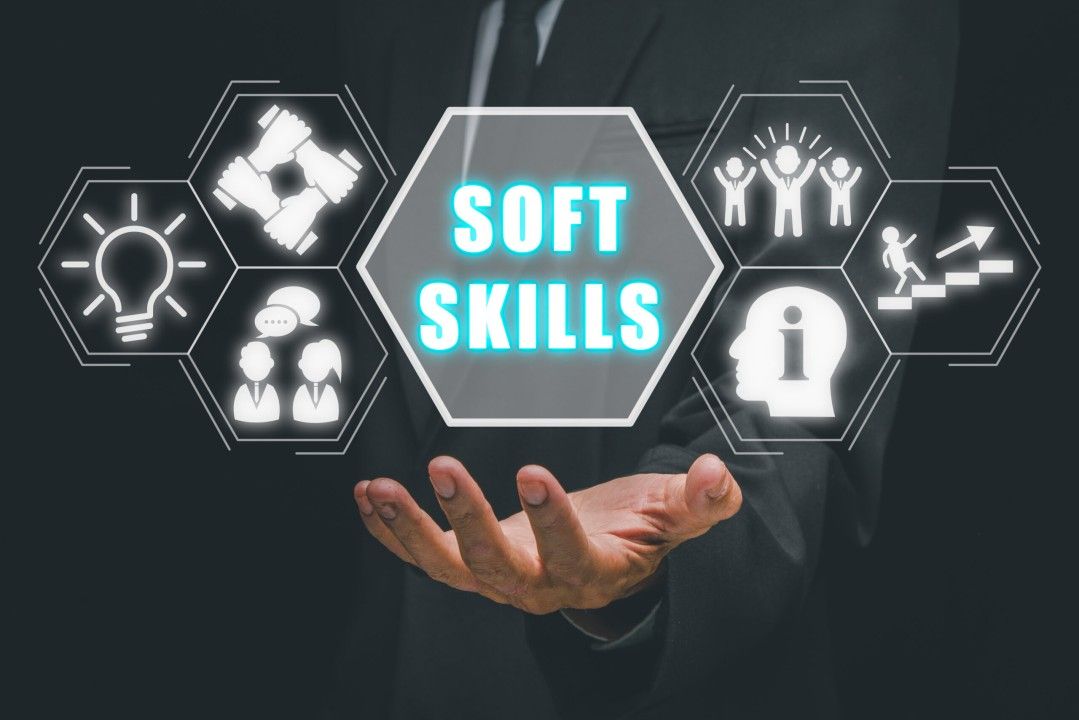what are soft skills A Comprehensive Guide
Explore the essential non-technical abilities, known as soft skills, crucial for personal and professional success. This comprehensive guide delves into communication, teamwork, adaptability, and more, providing insights to help you navigate the intricacies of the modern work landscape.

Soft skills, often termed interpersonal or people skills, are attributes extending beyond technical expertise. They've become a common focus due to their integral role in workplace dynamics. These skills, such as effective communication and adaptability, are deemed essential as they facilitate collaboration and positive interaction. In the contemporary professional setting, recognizing the value of soft skills is crucial for fostering a harmonious and productive work environment.
Necessity of Soft Skills in Modern Workplaces
In the modern workplace, soft skills—also known as people or interpersonal skills—go beyond technical competence. Their importance is undeniable in a workplace where collaboration and open communication are valued highly. These attributes—which include teamwork, adaptability, and communication skills—are essential for success in the job. Comprehending the pivotal function of soft skills is imperative for individuals traversing contemporary workplaces that prioritize collaboration and communication.
The Pitfalls of Overemphasizing Technical Proficiency
The complication arises when individuals focus solely on hard or technical skills, neglecting the crucial aspect of soft skills. While hard skills are undoubtedly essential, the ability to work harmoniously with others, communicate effectively, and adapt to different situations is equally critical. The misconception that technical proficiency alone guarantees success is a stumbling block that needs to be addressed.
What precisely is included in the soft skills category?
Communication Skills
Effective soft skills, particularly communication, transcend mere conversation. It involves articulating thoughts with clarity, ensuring active listening, and cultivating an inclusive atmosphere where every voice matters. Be it written or verbal exchanges, the skill lies in the nuanced ability to convey ideas comprehensively. This proficiency in communication stands as a foundational pillar for success in professional landscapes. It's not just about talking; it's about fostering genuine understanding and creating an environment where diverse perspectives can coexist harmoniously, contributing to a workplace where everyone feels valued and acknowledged.
Teamwork and Collaboration
Solitary is out of style in today's workplace. These days, success depends on diversified teams working together seamlessly. It is essential to be a dependable team player that respects other viewpoints and enhances group dynamics. These soft talents are crucial to productive teamwork, yet they are sometimes underestimated. They create an atmosphere that encourages teamwork and results in mutual success. These interpersonal skills are essential for reaching shared objectives and negotiating the intricacies of modern workplace culture in a world where teamwork is valued highly.
Adaptability
Given the fast-paced world of the modern workplace, flexibility is highly valued. People with soft skills understand that change is inevitable and that it's crucial to maintain an open mind to new concepts and welcome changes in a good way. It becomes a skill in and of itself to navigate through uncertainty, and in our fast-paced environment, flexibility is a great asset. It's not only about enduring change; it's also about embracing it with fortitude and hopes to make the always-changing obstacles of the job easier to overcome.
Time Management
One of the main components of professional credibility is efficient time management. The capacity to prioritize tasks, stay organized, and fulfill deadlines are key indicators of dependability and efficiency. It involves managing responsibilities effectively, making sure promises are kept, and fostering a trustworthy work environment. In the corporate world, when time is an important resource, people who are proficient in these areas not only increase their productivity but also have a favorable effect on the team's overall success. The often-overlooked ability of time management becomes a silent but powerful aspect in establishing and retaining credibility in the workplace as professionals struggle to accomplish targets and deliver outcomes.
Emotional Intelligence
Understanding and managing one's emotions while being empathetic toward others is the essence of emotional intelligence and is essential to successful social interaction. It involves recognizing the emotional background and using that awareness to skillfully negotiate social situations. This ability entails being aware of, controlling, and sensitive to both your own emotions as well as those of people around you. People can improve teamwork, create healthier relationships, and favorably impact the social dynamics of a variety of contexts by cultivating emotional intelligence. It's essentially a sophisticated comprehension of emotions and a deliberate application of that comprehension in social situations.
How Soft Skills Work

Soft skills relate to how you work. Soft skills include interpersonal (people) skills, communication skills, listening skills, time management, problem-solving, leadership, and empathy, among others.1 They are among the top skills employers seek in the candidates they hire because soft skills are important for just about every job.
Hiring managers typically look for job candidates with soft skills because they make someone more successful in the workplace.2 Someone can be excellent with technical, job-specific skills, but if they can't manage their time or work within a team, they may not be successful in the workplace.
Soft skills are also important to the success of most employers. After all, nearly every job requires employees to engage with others in some way.1
Another reason hiring managers and employers look for applicants with soft skills is that soft skills are transferable skills that can be used regardless of the person's job. This makes job candidates with soft skills very adaptable and flexible employees.
How To Get Soft Skills
Developing soft skills is a gradual process that involves self-awareness, practice, and a willingness to learn and adapt. Here's a practical guide on how to enhance your soft skills
1. Self-Assessment
Start by identifying which soft skills you currently possess and where there's room for improvement. Reflect on your experiences, both personal and professional, to gauge your strengths and weaknesses.
2. Set Goals
Establish clear and realistic goals for improving specific soft skills. Whether it's enhancing communication, becoming a better team player, or developing emotional intelligence, having defined objectives gives you a roadmap for growth.
3. Continuous Learning
Soft skills are dynamic and can always be refined. Seek out resources such as books, articles, online courses, or workshops that focus on the specific skills you want to develop. Stay informed about the latest trends and best practices in interpersonal skills.
4. Observe and Learn from Others
Pay attention to individuals who excel in the soft skills you want to improve. Whether it's a colleague, mentor, or public figure, observe their behaviors and communication styles. Identify the qualities that make them effective in various situations.
5. Seek Feedback
Actively seek feedback from colleagues, friends, or mentors. Constructive feedback can provide valuable insights into areas where you can enhance your soft skills. Be open to receiving feedback and use it as a tool for growth.
6. Practice Empathy
Cultivate empathy by putting yourself in others' shoes. Understand their perspectives, concerns, and emotions. This not only improves your emotional intelligence but also fosters positive relationships in both personal and professional settings.
7. Effective Communication
Work on expressing your thoughts clearly and concisely. Practice active listening by fully engaging in conversations, asking relevant questions, and demonstrating that you value others' input. Effective communication is at the core of many soft skills.
8. Join Networking Events
Attend networking events, workshops, or seminars to interact with a diverse group of people. Networking provides opportunities to practice social skills, build connections, and learn from others in various professional settings.
Soft skills, which go beyond technical expertise to promote efficient communication, teamwork, adaptability, time management, and emotional intelligence, are the cornerstones of success in the modern workplace. Professional development may be hampered by neglecting these crucial qualities. It is essential to acknowledge the importance of soft skills and to actively develop them through self-evaluation, goal-setting, ongoing education, and compassionate practice. People with strong soft skills are better equipped to handle the challenges of the workplace and flourish in diverse, collaborative settings in a world where flexibility is essential.





























































